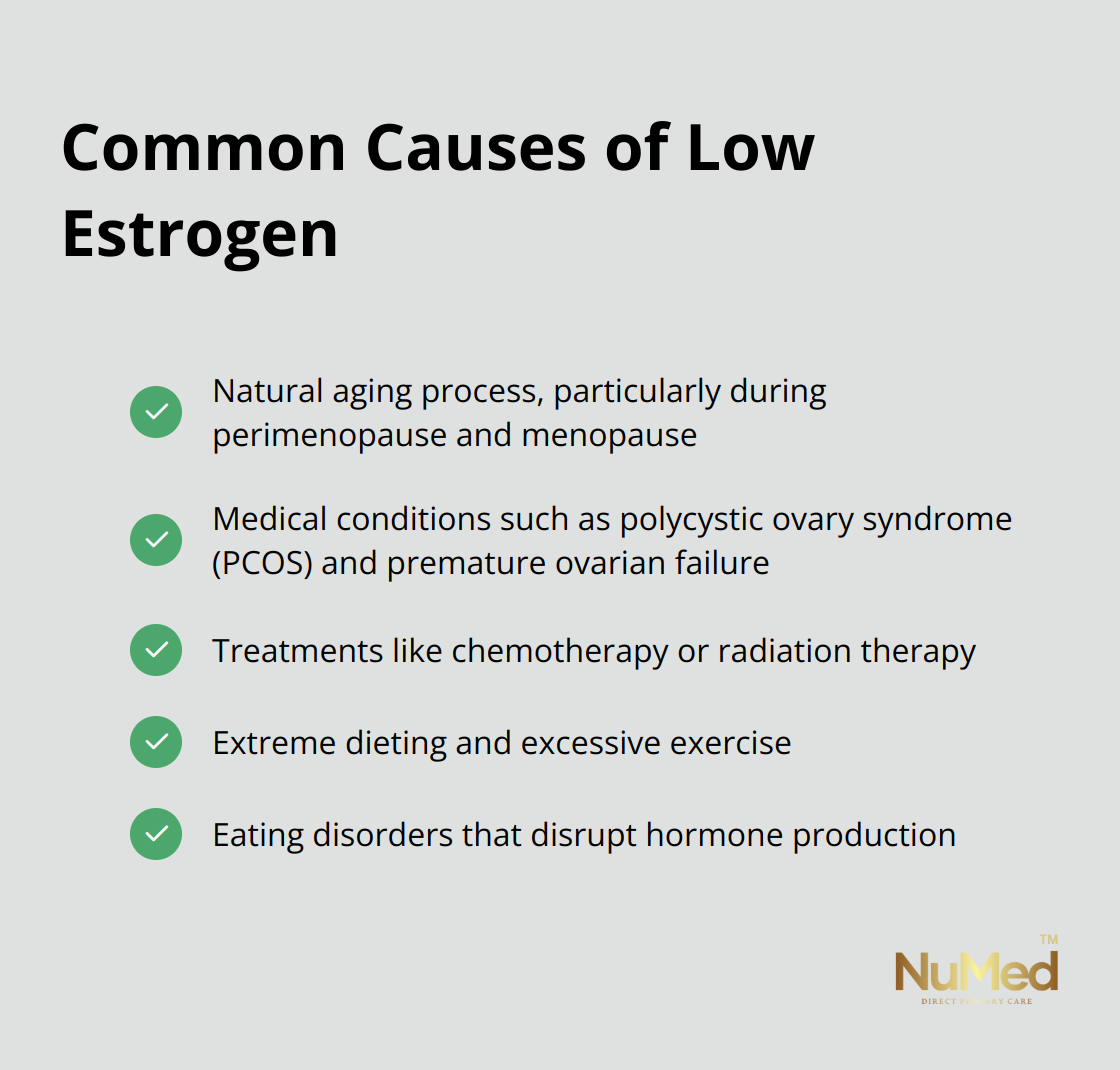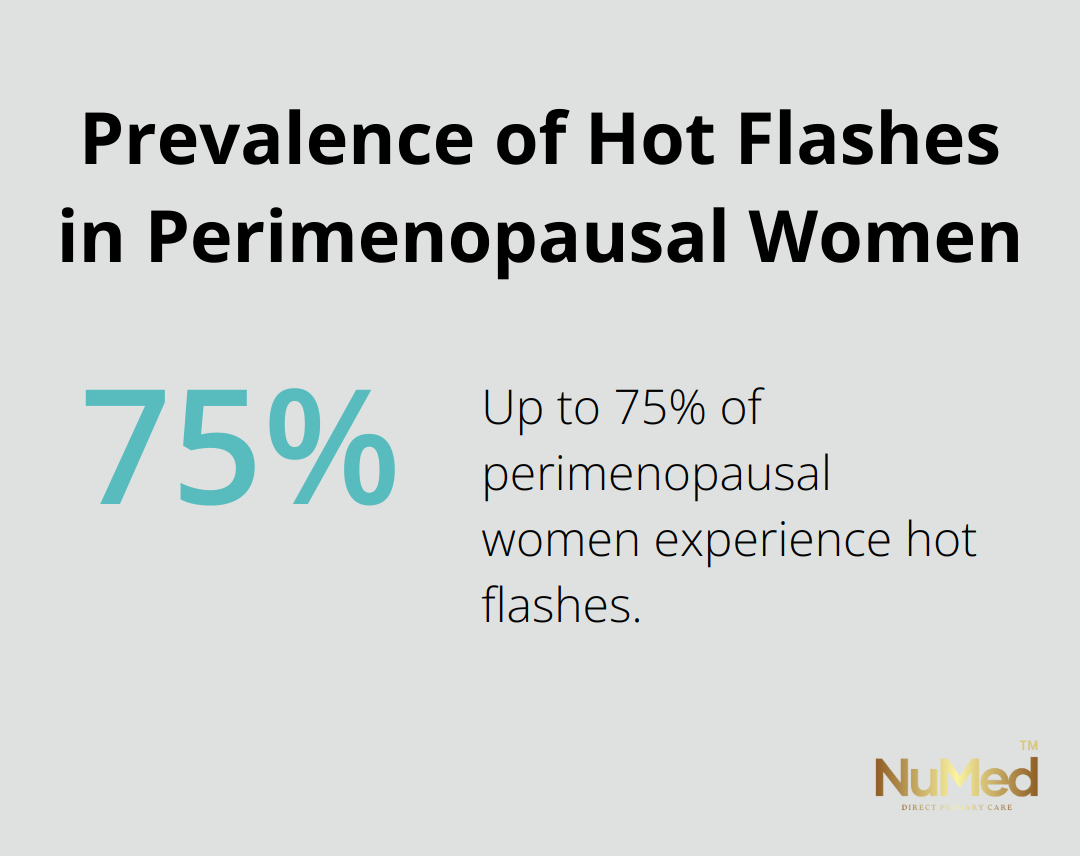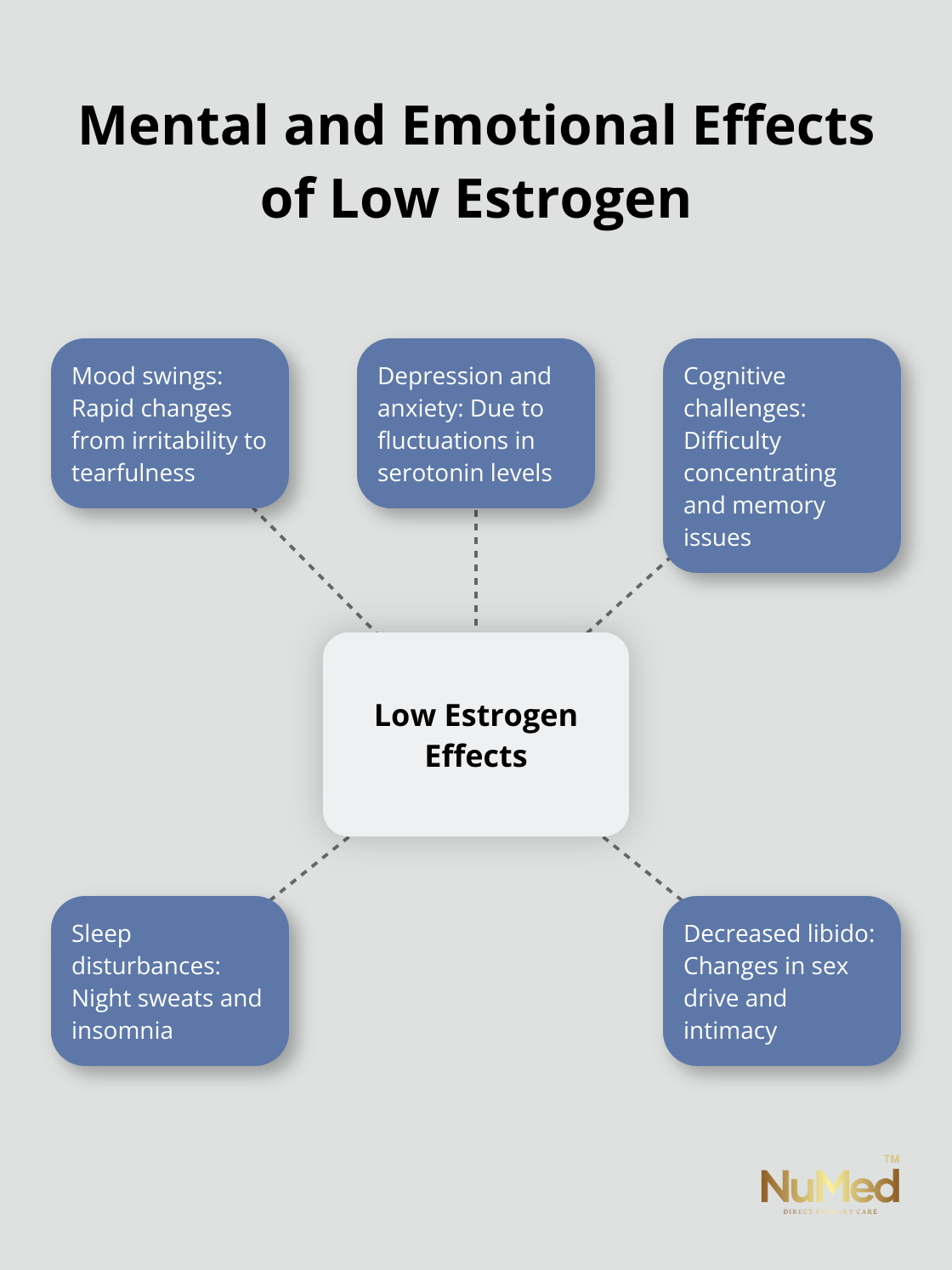At NuMed DPC, we understand the importance of recognizing signs of low estrogen in women’s health. Estrogen plays a crucial role in various bodily functions, and its decline can lead to significant physical and emotional changes.
In this blog post, we’ll explore the common symptoms of low estrogen and why it’s essential to identify them early. By understanding these signs, you’ll be better equipped to seek appropriate medical care and maintain your overall well-being.
What Is Estrogen and Why Does It Matter?
The Essence of Estrogen
Estrogen is a group of hormones that play a vital role in women’s health. The ovaries primarily produce these hormones, which regulate various bodily functions and contribute to overall well-being. Many patients express concern about their estrogen levels and want to understand how this hormone affects their health.
Estrogen’s Multi-Faceted Functions
Estrogen influences more than just reproductive health; it has wide-ranging effects throughout the body. This hormone helps maintain bone density, regulates cholesterol levels, and supports cognitive function. It also plays a significant role in skin elasticity and collagen production, which explains why many women notice changes in their skin as estrogen levels fluctuate.
Normal Estrogen Levels and Fluctuations
Estrogen levels naturally vary throughout a woman’s menstrual cycle and life stages. The abrupt decline in progesterone and estradiol levels at the end of the luteal phase triggers the shedding of the endometrium, which can no longer be maintained without hormonal support.
As women approach menopause (usually between ages 45 and 55), estrogen levels begin to decline. This transition can lead to various symptoms and health concerns that require careful management.
Common Causes of Low Estrogen
Several factors can contribute to low estrogen levels. The most common cause is the natural aging process, particularly during perimenopause and menopause. However, other factors can lead to estrogen deficiency:
Medical Conditions and Treatments
Certain medical conditions, such as polycystic ovary syndrome (PCOS) and premature ovarian failure, can affect estrogen production. Additionally, treatments like chemotherapy or radiation therapy can impact ovarian function and estrogen levels.

Lifestyle Factors
Extreme dieting, excessive exercise, and eating disorders can disrupt hormone production, including estrogen. Disordered eating raises particular concern in menopausal women as excessive dietary restriction could increase the risk for nutrient deficiencies. A balanced lifestyle is essential for hormonal health, which emphasizes the importance of nutrition and appropriate physical activity in maintaining optimal estrogen levels.
Understanding estrogen’s role in the body serves as the foundation for recognizing potential signs of low levels. This knowledge empowers individuals to monitor their health effectively and seek appropriate care when needed. The next section will explore the specific physical symptoms that may indicate low estrogen levels, providing valuable insights into this important aspect of women’s health.
Physical Signs of Low Estrogen
Menstrual Irregularities
Low estrogen levels often manifest through changes in menstrual patterns. Women may experience irregular periods, lighter flow, or a complete stop of menstruation. A recent study revealed that estrogen levels could swing dramatically from one cycle to the next during perimenopause, contributing to the variability in symptoms.
Vasomotor Symptoms
Hot flashes and night sweats are common vasomotor symptoms associated with low estrogen. These sudden feelings of intense heat (often accompanied by sweating and flushing) can disrupt daily activities and sleep patterns. The North American Menopause Society reports that up to 75% of perimenopausal women experience hot flashes.

Urogenital Changes
Low estrogen levels can cause vaginal dryness, discomfort during intercourse, and an increased risk of urinary tract infections. The thinning and drying of vaginal tissues (known as vaginal atrophy) affects up to 50% of postmenopausal women, according to the International Menopause Society.
Bone Health Concerns
Estrogen plays a vital role in maintaining bone density. As levels decline, the risk of osteoporosis increases. Recent research indicates that in the United States, osteoporosis leads to around 1.5 million fractures annually, with most of these incidents occurring in women who have gone through menopause. Regular bone density scans and calcium-rich diets become increasingly important as estrogen levels decrease.
Breast Tissue Changes
Women with low estrogen may notice changes in breast tissue, including decreased fullness and increased tenderness. While these changes are normal, it’s important to continue regular breast examinations and mammograms to monitor for any concerning developments. When starting hormone therapy, there may be mild, temporary breast changes as well.
These physical signs of low estrogen serve as important indicators for potential hormonal imbalances. Early recognition of these symptoms can lead to timely intervention and appropriate care. The next section will explore the emotional and cognitive signs associated with low estrogen levels, providing a comprehensive understanding of how this hormonal change can affect overall well-being.
How Low Estrogen Affects Your Mind
The Emotional Rollercoaster
Low estrogen levels impact more than just your body; they significantly influence your mental and emotional well-being. Mood swings are a common complaint among women experiencing low estrogen. You might feel irritable one moment and tearful the next. These rapid mood changes can frustrate you and impact your relationships.
Depression and anxiety can also increase as estrogen levels drop. Estrogen regulates serotonin, a neurotransmitter that affects mood. When estrogen decreases, serotonin levels can fluctuate, potentially leading to feelings of sadness or worry. If you experience persistent low mood or anxiety, discuss this with a healthcare provider.
Cognitive Challenges
Many women report difficulty concentrating or feeling like they’re in a “brain fog” when estrogen levels are low. You might struggle to focus at work or forget simple tasks. A recent study found no linear association between menopause age and dementia incidence within 5 years in a cohort of older women in China.
To combat these cognitive challenges, incorporate brain-boosting activities into your routine. Puzzles, learning a new skill, or regular exercise can help maintain cognitive function. A healthcare provider can work with you to develop strategies to support your brain health during this transition.

Sleep Disturbances and Their Impact
Low estrogen can disrupt your sleep patterns. Night sweats can wake you up, and insomnia becomes more common. Poor sleep doesn’t just leave you tired; it can worsen mood swings and cognitive difficulties.
Establish a consistent sleep routine to help. Keep your bedroom cool, avoid screens before bedtime, and try relaxation techniques like deep breathing or meditation. If sleep issues persist, talk to a healthcare professional about potential treatments (including hormone therapy options).
Libido and Intimacy
A decrease in sex drive is another common effect of low estrogen. This can result from a combination of factors, including vaginal dryness and mood changes. Communicate openly with your partner about these changes and explore ways to maintain intimacy.
Healthcare providers understand the sensitive nature of these issues and offer compassionate care to address sexual health concerns. From lubricants to hormone therapies, various options can help you maintain a satisfying sex life.
Final Thoughts
Signs of low estrogen can significantly impact your overall health and well-being. These indicators range from physical symptoms like irregular periods and hot flashes to emotional changes such as mood swings and cognitive difficulties. You should pay attention to these changes as they signal potential shifts in your body’s hormonal balance.
We strongly advise you to consult a healthcare provider if you experience signs of low estrogen. A professional can perform thorough evaluations, including hormone level tests, to determine the root cause of your symptoms. They will then develop an appropriate treatment plan tailored to your individual needs.
At NuMed Direct Primary Care, we offer personalized care to address your unique health concerns. Our approach focuses on preventing illness and supporting both your physical and emotional health. You can take control of your well-being with the right support and care during this transition.
















